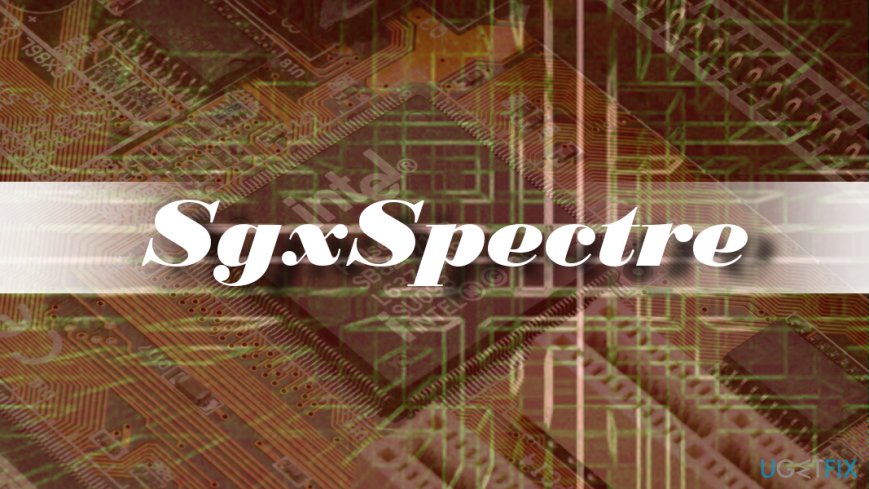The newest Spectre attack dubbed as SgxSpectre can expose sensitive data stored in SGX enclaves at risk

Spectre-Meltdown CPU flaw[1] detected at the beginning of 2018 pose more of a challenge than it was expected by Microsoft, Intel, and other tech giants. Not only it managed to extend from Intel and AMD chips to Skylake, Kaby Lake, Coffee Lake chips; it allowed hackers to initiate multiple malware distribution campaigns[2] and software-based attacks.
At the beginning of March 2018, a group of six IT researchers from Ohio State University detected a new variant of Spectre attack dubbed as SgxSpectre, which can be used for cracking Intel's Software Guard Extensions (SGX) enclaves which are responsible for the isolation of sensitive components. In fact, the data guarded by these enclaves is probably most sensitive of all since operating system's components are not allowed to interact with the enclave-protected data.
Caroline Trippel and Daniel Lustig, researchers from Princeton University, and Margaret Martonosi from Nvidia foreseen the possibility of such attacks and outlined the scenario in a scientific work called “MeltdownPrime and SpectrePrime: Automatically-Synthesized Attacks Exploiting. Invalidation-Based Coherence Protocols.”[3] These are the newest Meltdown and Spectre vulnerabilities that can end up with sensitive data attacked.
Previous Meltdown and Spectre vulnerabilities did not have access to sensitive data protected by SGX
Intel's Software Guard Extensions (SGX) is a relatively new feature, which is available in modern Intel's' processors. It allows creating so-called enclaves for software protection, which deals with extremely sensitive data and coding information.
The aftereffects of the previous Spectre and Meltdown attacks on the SGX were not clear. Nevertheless, the immunity of the SGX enclaves raised many questions from the very beginning. It turned out that neither of these vulnerabilities exhibit traits allowing to crack SGX protection, but apparently hackers target for the data inside the enclaves. That's why SgxSpectre evolved.
According to SgxSpectre vulnerability researchers,[4] the vulnerability allows the exploitation of “the race condition between the injected, speculatively executed memory references, which lead to side-channel observable cache traces, and the latency of the branch resolution.” Currently, the vulnerability can affect Intel SGX, SDK, Rust-SGX, and Graphene-SDX.
The system can be affected when a specific code pattern in software libraries is enabled. The attacker that targets for the information kept within enclaves employ speculative execution and perform the prediction of enclave code by looking for small variations of cache size. As explained by the researchers,
The branch prediction units used in the enclave mode for predicting branch targets are not thoroughly cleansed upon enclave entrance. Therefore, code outside the targeted enclave (either running in the unprotected memory region or in another enclave) can manipulate the targets of the branch prediction inside the targeted enclave.
Intel has released a vulnerability scanning tool
The whole procedure might seem difficult for people who are not entangled in IT world. In a nutshell, with the help of Meltdown and Spectre vulnerabilities, hackers found a way to exploit the weaknesses of SDX code patters. These vulnerabilities subsequently allow hackers to modify SDK runtime libraries and attack any system developed with the Intel's official SGX SDK.
Intel and Microsoft reacted to the detected Meltdown and Spectre vulnerability immediately and started releasing patches. Unfortunately, not all of them are working, so it's a must to follow the news about this vulnerability.
Indirect Branch Restricted Speculation (IBRS) is one of the fixes represented by Intel. It addresses the Spectre Variant with the provision of adapted microcode. However, this patch is not oriented to SGX SDK vulnerability.
The deadline for the SgxSpectre patch release date is March 16, 2018. App developers will have to change older SDK version with the one that Intel is about to release into the SGX-based apps.
Those who want to check whether their PC's contain vulnerable codes, specialists created a vulnerability scanning tool,[5] which verifies enclave programs and checks code patters. In case SgxPectre exploits are detected, the user will be warned and urged to install the toolkit developed by Intel along with outdated software development toolkit for SGX application providers.
- ^ Linas Kiguolis. Millions of computers left vulnerable by Meltdown and Spectre exploits. UgetFix. Provides detailed and easy to follow instructions regarding computer errors.
- ^ Gabriel E. Hall. Fake Meltdown and Spectre patches deliver Smoke Loader malware. 2-Spyware. The largest sources of security and tech-related information.
- ^ Caroline Trippel, Daniel Lustig, and Margaret Martonosi. MeltdownPrime and SpectrePrime: Automatically-Synthesized Attacks Exploiting Invalidation-Based Coherence Protocols. Princeton University. Arxiv PDF document.
- ^ Spectre attack against SGX enclave. GitHub. The group of software development enthusiasts.
- ^ Category:Vulnerability Scanning Tools. OWASP. The Open Web Application Security Project.



